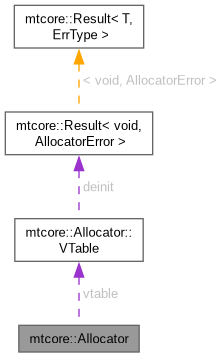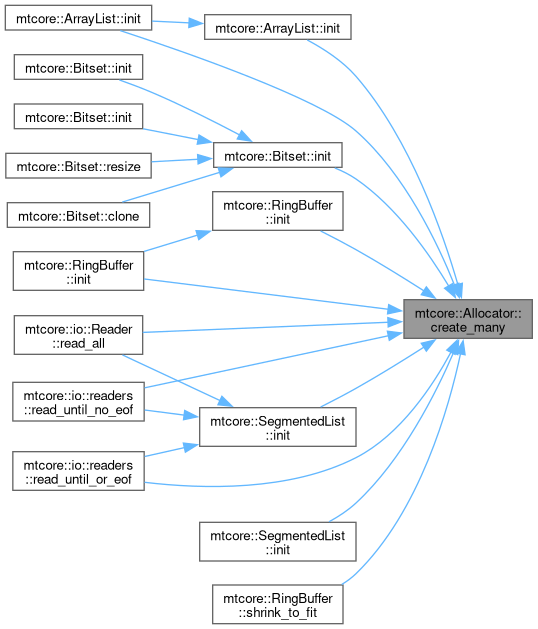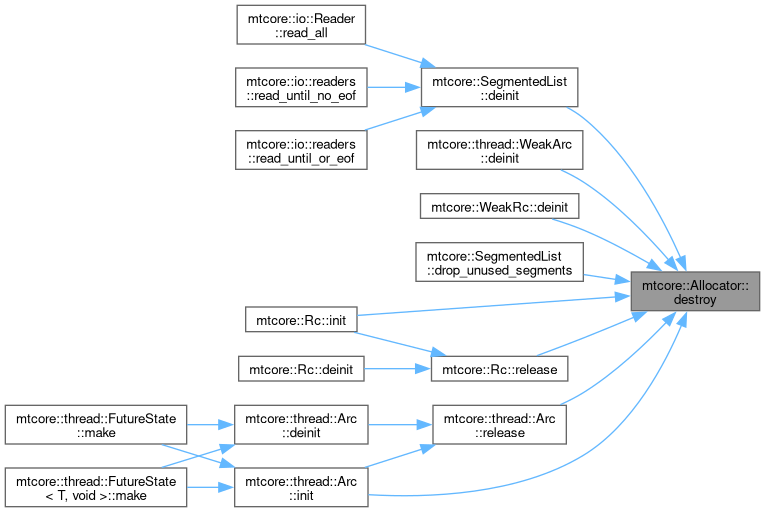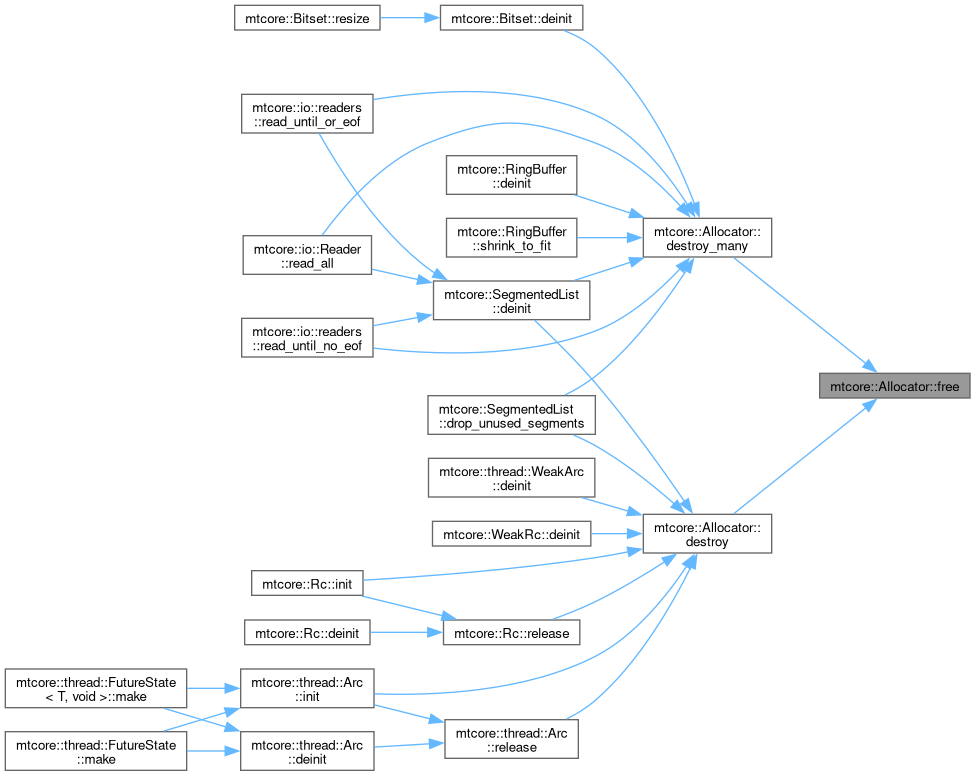Represents a memory allocator Exact behavior depends on the underlying VTable used Should use the a_* methods for working with an allocator. More...
#include <alloc.hpp>

Classes | |
| struct | VTable |
| V-Table for implementing your own allocator Each allocator has state, some of which is standardized (e.g. More... | |
Public Member Functions | |
| Result< void, AllocatorError > | deinit () |
| De-initializes a memory allocator. | |
| Result< void *, AllocationError > | alloc (size_t bytes) |
| Allocates some block of memory with an allocator May fail. | |
| template<typename T> | |
| Result< Slice< T >, AllocationError > | create_many (size_t count=1) |
| Allocates some block of memory with an allocator with a known type Will call default constructor on the memory block. | |
| template<typename T, typename... Args> | |
| Result< T *, AllocationError > | create (Args... args) |
| Allocates some block of memory with an allocator with a known type Will pass arguments to the constructor call for the element May fail. | |
| Result< void *, AllocationError > | realloc (void *ptr, size_t newBytes) |
| Attempts to reallocate a block of memory to either shrink it or grow it. | |
| template<typename T> | |
| void | free (T *&ptr) |
| Marks a block of memory as "free-able" May or may not immediately deallocate memory, depending on what the allocator does Also sets the passed in pointer to nullptr;. | |
| template<typename T> | |
| void | destroy (T *&ptr) |
| Destroys an object allocated by this allocator by calling the destructor and freeing memory. | |
| template<typename T> | |
| void | destroy_many (Slice< T > s) |
| Destroys objects allocated by this allocator by calling the destructors and freeing memory. | |
Public Attributes | |
| const VTable * | vtable = nullptr |
| VTable to allocation-related methods. | |
| void * | state = nullptr |
| Internal state for the allocator. | |
Detailed Description
Represents a memory allocator Exact behavior depends on the underlying VTable used Should use the a_* methods for working with an allocator.
Definition at line 72 of file core/mtcore/alloc.hpp.
Member Function Documentation
◆ alloc()
|
nodiscard |
Allocates some block of memory with an allocator May fail.
On failure, AllocRes.type will be FAIL, and ptr will be nullptr
- Parameters
-
bytes Number of bytes to allocate
- Returns
- Returns an allocation Result containing allocated bytes
◆ create()
|
inlinenodiscard |
Allocates some block of memory with an allocator with a known type Will pass arguments to the constructor call for the element May fail.
On failure, AllocRes.type will be FAIL, and Slice will be empty
- Template Parameters
-
T Type of object to allocate (MUST be default constructible)
- Parameters
-
args Constructor arguments
Definition at line 196 of file core/mtcore/alloc.hpp.


◆ create_many()
|
inlinenodiscard |
Allocates some block of memory with an allocator with a known type Will call default constructor on the memory block.
May fail. On failure, AllocRes.type will be FAIL, and Slice will be empty
- Template Parameters
-
T Type of object to allocate (MUST be default constructible)
- Parameters
-
count Number of objects to allocate
Definition at line 171 of file core/mtcore/alloc.hpp.


◆ deinit()
|
nodiscard |
De-initializes a memory allocator.
Assume that it makes the allocator invalid to use for future use (unless otherwise stated by the creator)
Can check for memory leaks and report them via ErrCode
- Returns
- Error code if anything goes wrong during initialization
◆ destroy()
| void mtcore::Allocator::destroy | ( | T *& | ptr | ) |
Destroys an object allocated by this allocator by calling the destructor and freeing memory.
- Template Parameters
-
T Type of element to destroy, will call destructor
- Parameters
-
ptr Pointer to element to destroy, will call destructor
Definition at line 466 of file core/mtcore/alloc.hpp.


◆ destroy_many()
| void mtcore::Allocator::destroy_many | ( | Slice< T > | s | ) |
Destroys objects allocated by this allocator by calling the destructors and freeing memory.
- Template Parameters
-
T Type of element to destroy, will call destructor
- Parameters
-
s Slice of elements to destroy, will call destructor on each
Definition at line 480 of file core/mtcore/alloc.hpp.


◆ free()
|
inline |
Marks a block of memory as "free-able" May or may not immediately deallocate memory, depending on what the allocator does Also sets the passed in pointer to nullptr;.
- Parameters
-
ptr Pointer to memory to free
Definition at line 249 of file core/mtcore/alloc.hpp.

◆ realloc()
|
nodiscard |
Attempts to reallocate a block of memory to either shrink it or grow it.
If the operation cannot be done in place, the allocator may allocate a new block of memory and copy the bytes over May fail. On failure, AllocRes.type will be FAIL and ptr will be nullptr
NOTE: A failure here does NOT mean there's no more memory available, only that the allocator cannot reallocate blocks This may happen if, for example, the allocator does NOT track individual allocations and therefore cannot reallocate blocks This may happen with simple arena allocators, for example
- Parameters
-
ptr Pointer to existing memory allocated by this allocator newBytes Number of new bytes to have for the allocator (bigger = grow, smaller = shrink)
- Returns
- On success, pointer to new memory, on failure nullptr. On success, old memory is freed, on failure old memory is preserved.
Member Data Documentation
◆ state
| void* mtcore::Allocator::state = nullptr |
Internal state for the allocator.
Definition at line 140 of file core/mtcore/alloc.hpp.
◆ vtable
| const VTable* mtcore::Allocator::vtable = nullptr |
VTable to allocation-related methods.
Do not use directly
Definition at line 137 of file core/mtcore/alloc.hpp.
The documentation for this struct was generated from the following file: